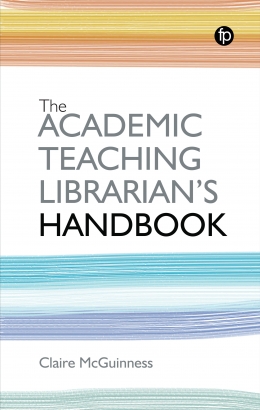
Primary tabs
You don't need to be an ALA Member to purchase from the ALA Store, but you'll be asked to create an online account/profile during the checkout to proceed. This Web Account is for both Members and non-Members. Note that your ALA Member discount will be applied at the final step of the checkout process.
If you are Tax-Exempt, please verify that your account is currently set up as exempt before placing your order, as our new fulfillment center will need current documentation. Learn how to verify here.
- Description
- Table of Contents
- About the author
- Reviews
The Academic Teaching Librarian's Handbook is an indispensable reference, suitable for early career professionals at the start of their teaching journey, as well as mid- or late-career librarians who may have moved into leadership and managerial roles and who wish to advance their teaching role to the next level.
The Academic Teaching Librarian's Handbook is a comprehensive resource for academic library professionals and LIS students looking to pursue a teaching role in their work and to develop this aspect of their professional lives in a holistic way throughout their careers. The book is built around the core ideas of reflective self-development and informed awareness of one's personal professional landscape. Through engaging with a series of exercises and reflective pauses in each chapter, readers are encouraged to reflect on their professional identity, self-image, self-efficacy, and progress as they consider each of the different aspects of the teaching role. This handbook
- provides a comprehensive resource on teaching, professional development, and reflective practice for academic teaching librarians at all stages of their careers;
- explores the current landscape of teaching librarianship in higher education, and highlights the important developments, issues, and trends that are shaping current and future practice;
- examines the roles and responsibilities of the academic teaching librarian in the digital era;
- introduces the essential areas of development, skill, and knowledge that will empower current and future professionals in the role;
- will inspire prospective and current academic teaching librarians to adopt a broad conception of the role that goes beyond the basic idea of classroom-based teaching; and
- provides practical tools to engage in personal development and career planning.
Introduction
Part 1 Constructing the academic teaching librarian
1 Shaping the academic teaching librarian
1.1 Introduction: critical issues for academic teaching librarians
1.2 Conceptions of literacy: terminology and the academic teaching librarian
1.3 New frameworks: information literacy in context
1.4 Critical information literacy
1.5 Social media and filter bubbles: the rise of 'fake news'
1.6 Learning analytics
1.7 E-research and datafied scholarship
2 Defining the academic teaching librarian
2.1 Introduction: who is the academic teaching librarian?
2.2 Professional identity and 'teacher identity'
2.3 Roles and responsibilities of academic teaching Librarians
2.4 The information-literate self
2.5 Reflective practice for academic teaching librarians
2.6 Developing a personal teaching philosophy
3 Becoming an academic teaching librarian
3.1 Introduction: choosing the academic teaching librarian pathway
3.2 Looking inwards: self-analysis and the teaching role
3.3 Does a 'teaching personality' exist?
3.4 Mapping your teaching profile
3.5 Planning and developing your teaching role
3.6 Keeping current with teaching trends
3.7 Documenting and showcasing your work; teaching portfolios for librarians
Part 2 Excelling as an academic teaching librarian
4 Technology and the academic teaching librarian
4.1 Introduction: the digital environment for academic teaching librarians
4.2 Teaching, learning and technology – key concepts
4.3 The digital imperative in higher education
4.4 Digital education in higher education (HE): state of the art
4.5 Digital learning and the academic teaching librarian
4.6 Digital learning knowledge domains: a framework for academic teaching librarians
4.7 Levels of skill and expertise for digital learning
4.8 Additional digital learning competence frameworks
4.9 A reflective approach to planning and designing digital learning
4.10 A final word on digital learning
5 Leading and co-ordinating for the academic teaching librarian
5.1 Introduction: leadership, management and culture
5.2 Leadership and the academic teaching librarian
5.3 Coordinating your library's information literacy programme
5.4 Creating an information literacy culture in your institution
5.5 Engaging with the wider community of teaching librarians
6 Advocacy and the academic teaching librarian
6.1 Introduction: reflecting on advocacy
6.2 Advocacy and libraries
6.3 Advocacy and academic teaching librarians
6.4 Information literacy: communicating value
6.5 Ways of engaging in advocacy
6.6 Writing for academic publications: a reflective view
Claire McGuinness
Claire McGuinness is Assistant Professor and current Deputy Head of School at the School of Information and Communication Studies, University College Dublin, Ireland. She has a long-term interest in researching and teaching information and digital literacy and has published extensively in these areas and others including academic librarianship, reflective practice and teaching skills for librarians. She has designed and taught multiple information and digital literacy modules over the past two decades, and currently leads several courses on the MLIS and BSc Social Sciences programmes at UCD. Since 2004, her advanced teaching librarian course on the MLIS and Diploma programs at UCD has prepared trainee librarians for the instructional work that is increasingly part of their professional remit in different sectors.
"A timely and substantive contribution as we face rapid changes in the publishing and scholarly communication environment. While library instruction was once about basic information literacy for students, now we must also include topics such as research data management, research integrity and research evaluation, to name a few, and involve a wider audience including researchers at different career stages. The role of librarians as teachers, advocates and leaders is well described and discussed in this book. I would recommend every librarian has it on their shelf as you are sure to need it from time to time!"
— Dr. Lai Ma, University College Dublin


